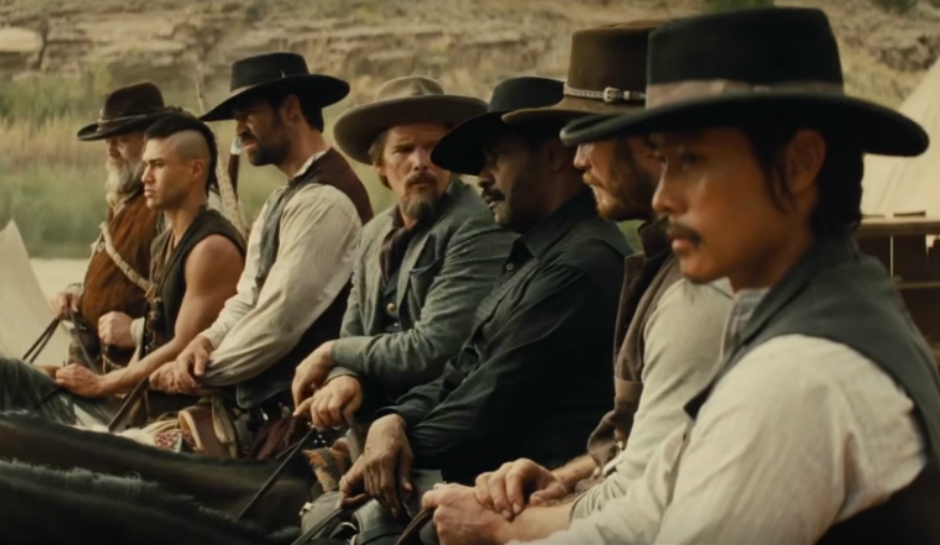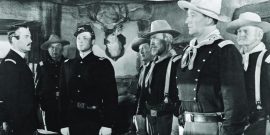The Decline of the Western
Tired of rants about how awful capitalism is? Here’s a fun trick: ask the people you’re discussing it with not to use the term “capitalism.” Politely suggest: since we seem to mean different things by it, let’s just say what we mean without using that one word. It might induce them to think, instead of grabbing pre-fab terms of abuse off the shelf and blaming every problem on that villain from central casting, the capitalist.
Emotionally loaded and so vague as to be almost useless, the word “capitalism” masks the massive phenomenon’s complexity—its fuel in varied motives, its entwinement with a legal order, and (most importantly) its moral ambiguities and mixed blessings.
But aren’t you bored? Thinking is just so . . . boring. Let’s complain about capitalism instead.
The new Magnificent Seven remakes John Sturges’ 1960 classic of the same name and has lots of complaining to do about “capitalism,” at the expense of its predecessor’s subtle and interesting civilizational themes.
Though not so often batted around disdainfully, the word “civilization” suffers a similar vagueness. A good Western helps us appreciate that term’s complexity. John Ford’s carefully balanced Stagecoach (1939)—with its generous salesman and corrupt banker, its sturdy sheriff and imperfect court system—ends with the bad guy getting his, and the embezzler getting handcuffs. The fugitive and the prostitute then escape the law, and the snobbish “Law and Order League,” as Doc (played by the inimitable Thomas Mitchell) quips: “Well, they’re saved from the blessings of civilization.”
Two cheers for civilization!
In the original Magnificent Seven, a Mexican village beset by bandits cannot count on the absentee rurales (mounted police). The Old Man advises the farmers to buy guns north of the border—“guns are plentiful there”—but they buy gunmen instead. The seven hired loners lead the village’s defense against Calvera (Eli Wallach) and his gang. The film displays the superiority of the quietly industrious village over the Old West town. Yet, the farmers’ settled, communal life requires defense by unsettled, strong individuals, naturally drawn to other goods.
In an early scene, a traveling salesman (ladies’ corsets) passing through the Old West town does “what any decent man would”—pays the coroner after watching people step over the corpse of Old Sam in the street. But some townsmen object to the Indian’s burial in the potters’ field filled with white murderers and robbers. “How long has this been going on?” the salesman asks. “Since the town got civilized,” the coroner responds, apologetically.
“I don’t like it,” he adds. “I’ve always treated every man the same—just as another future customer.” The mixed blessings of capitalism, encapsulated in a sentence. Whether from decency or morbid self-interest, the two businessmen rise above bigotry, but still need tough guys Chris (Yul Brynner) and Vin (Steve McQueen), who volunteer to drive the hearse past the shotguns. This one scene in the old movie packs more thought about commerce and civilization than the new movie’s entire 133 minutes.
In their youthful independence, Chris and Vin’s main objection to civilization is that it’s boring. But once their gang arrives to defend the village, the quiet life becomes charming, admirable, worth defending. The American individualists gradually appreciate its wholesome excellence. Like midlife, civilization has its goods—but so do youth and independence. Superior in one way, inferior in another, Chris and Vin ride off after saving the village, while Chico—in love—stays for the long haul of settled life.
Erasing these reflections on capitalism and civilization, community and character, Antoine Fuqua’s new Magnificent Seven hunts smaller game.
The new movie only superficially displays a contemporary liberalism. Much has been made of its ostentatiously diverse seven, “a rainbow coalition.” An African American leads the team, which includes a Native American, a Mexican, an Asian American, and a minority of white guys (all three die). As Anthony Lane comments in The New Yorker, “It was difficult to ignore the patronizing tone of Sturgis’ tale, in which helpless Mexican villagers in white blouses are saved and blessed by the intervention of American tough guys, so the new version is wise to recruit a Latino gunslinger to the front line.”
Here Lane betrays a common prejudice against midcentury America. In Sturges’ film, Chico is Mexican, “from a village just like that one,” and Bernardo half-Mexican, even though the actors playing Chico and Bernardo (Horst Buchholz and Charles Bronson) were not. Also, in Sturges’ version the problem was not that Mexicans cannot be “tough guys.” The trouble was that the wrong people were tough. Westerns often emphasize the fact—a truth across ethnicities and a difficulty for all civilizations—that good people are less likely to be good fighters. Worse still, lost on Lane and director Fuqua is that the 1960 film asserts the Mexican village’s superiority over the American town.
Replacing respect for age’s wisdom with another salute to demographic identity, the new film gives us, instead of the village elder, a twenty-something woman (Emma Cullen, played by Haley Bennett), who hires the fighters. Thus the seven men are supplemented (not complemented) by this magnificent eighth—a femme Americaine who not only announces herself as the only person around “with balls” but proves herself, bizarrely, the only one in this 1870s Old West town competent with a gun. Even those women among us, like me, happily formed by such American celebrations of the tough girl should dismiss this flattery as more trite token-counting.
Most commenters have pointed to its diversity as the remake’s main innovation. The ethnicities of the seven prove irrelevant, however, as do their colorful personalities. In fact the show of diversity obscures a more consequential difference between the films. Unlike its predecessor, this film is playful, inclusive, and liberal only on the surface; at its core it is an angry, radical fantasy.
In Sturges’ version, the government fails to protect the village from bandits. The new version replaces the pack of lawless bandits with one person, that villain from central casting: a capitalist, cops in pocket.
“The country has long equated democracy with capitalism and capitalism with God,” he lectures us. Labeled “a rich man” and “a robber baron,” Bartholomew Bogue (Peter Saarsgard) appears more as a psychopath, murdering early, often, and en masse, even his own men, irrationally. Yet Bogue’s form of capitalistic evil “looks awfully, uncomfortably familiar” to the Washington Post.
How banal, especially compared to Eli Wallach’s 1960 bandit leader Calvera. Strategic and charming, Wallach’s villain for the ages was brutal and philosophical by turns. Sarsgaard’s Bogue fails even to amount to a character. Though “it’s not a movie where we’re going to be exploring what makes Bogue tick,” Sarsgaard explains, he was drawn to portray this awful person’s “sense of personal grandeur,” likening the murderer to a candidate in the 2016 presidential election (as do several reviewers). Classic Westerns complicate even their good guys with dark edges. Here, the badness of a capitalist permits no complication.
While aiming to correct the supposedly patronizing treatment of the Mexican farmers in Sturges’ version, the remake breaks new ground in this area with its portrayal of Bogue’s miners. Because the men of Rose Creek prove incompetent with guns, the seven go to a nearby Bogue-controlled town to recruit. After sharpshooting the managers of the goldmine from afar, the seven declare to the workers, “This mine is now closed. You men are free to go, or you can stay and fight!” While it’s true that people often resent their employers, this seems an odd way to announce sudden joblessness to a group of men upon the violent death of their boss.
In a striking transformation of the 1960 version’s battle for the village, Bogue turns a Gatling gun on the entire town, even his own men, symbolizing the film’s central claim: that what mechanized firearms do to fighting, capitalism does to banditry. In sum, the movie pays lip service to our persistent ethnic and racial differences in order to focus our sights on our common enemy: mass-murdering capitalism. Celebrating violence against management, condescending to workers, this is a radical film.
It would insult the devil’s intelligence to label Bogue’s character satanic, since he lacks even a strategic restraint in service of medium-term gains. In the 1960 Sturges movie, the leader of the seven shows a self-possessed, gentle nobility. In the 2016 version, raw revenge motivates the leader, Chisolm (Denzel Washington). At the climax, before the tough girl shoots the bad guy, our hero Chisolm is strangling the villain to death in a church while forcing him to recite the Lord’s Prayer. The only glimpse of realistic satanic darkness comes, thus, from the character who should provide the movie’s moral center.
Bloodthirsty revenge fantasies against the “rich man” make for lame movies. In this case such political immaturity is unforgiveable, for Fuqua and his scriptwriters seem to have intentionally erased the sophisticated civilizational reflections in Sturges’ 1960 film and in the film Sturges adapts, Akira Kurosawa’s The Seven Samurai (1954).
“The price of corn is going up,” Chris remarks on the eve on battle. Bored with civilization, and with thought, and especially with thought about civilization, unwilling to face the moral ambiguities and mixed blessings of modern civilization like a man, the filmmakers flunk even the basic economic lesson of the Western: the price of corn includes the courage and blood needed to defend people and their property.
Alas, following that thought through might lead to an appreciation of what some other people mean by “capitalism.” It is a vague word.



